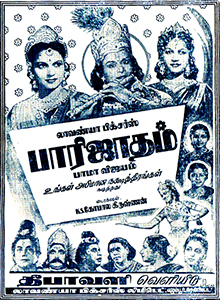Parijatham (1950 film)
| Parijatham | |
|---|---|
 | |
| Directed by | K. S. Gopalakrishnan[a] |
| Screenplay by | Elangovan |
| Based on | Naragasura Epic |
| Produced by | S. K. Sundararama Iyer |
| Starring | T. R. Mahalingam B. S. Saroja M. V. Rajamma N. S. Krishnan T. A. Madhuram |
| Cinematography | Jithen Banerji |
| Edited by | A. V. Subba Rao |
| Music by | C. R. Subbaraman S. V. Venkatraman |
Production company | Lavanya Pictures Ltd. |
| Distributed by | Newtone Vauhini |
Release date |
|
| Country | India |
| Language | Tamil |
Parijatham is a Tamil language film released in 1950 with T. R. Mahalingam, M. V. Rajamma and B. S. Saroja in the lead roles.[2]
Plot[]
The film has three story lines. The first line which is the first part is about the well known myth of Naragasura. Naragasura, the demon king has invincible powers due to the boons he had received from Devas and with all that he wreaks havoc on everyone. Narada knows that only Bama, the wife of Krishna who was Naragasura's mother in the previous birth can annihilate him. Narada adept in his covert ways to achieve his goals subtly gifts a parijatham flower to Krishna and make him in turn gift it to his first wife Rukmani. As expected the demon king dies at the hands of Bama but not before making a request that his day of death be celebrated by people as Deepavali. The next story line has the same parijatham that breeds enmity in Bama against Rukmani. Finally she understands that Rukmani's devotion to Krishna far exceeds her own, a humbling experience. There is a third line which is a comic interlude that intersects the film throughout. N.S.krishnan, T.A.Mathuram and side kicks Kaka Radhakrishnan and Pulimootai Ramasamy take care of that.[3]
Cast[]
Cast according to the opening credits of the film[3]
|
|
|
Production[]
The film was produced by S. K. Sundararama Iyer under the banner Lavanya Pictures and was shot at Newtone and Vauhini studios. The film was directed by K. S. Gopalakrishnan B. A.[a] Screenplay and dialogues were written by Elangovan. Jithen Banerji was in charge of cinematography while Kumaradevan was the operative cameraman. Editing was done by A. V. Subba Rao. Dinsha K. Tehrani was in charge of audiography. Art direction was done by F. Nagoor while Hiralal did the choreography.[1][3]
Soundtrack[]
Music was composed by C. R. Subbaraman and S. V. Venkatraman Lyrics were written by Santhanakrishna Naidu, Papanasam Sivan, Kambadasan, Udumalai Narayana Kavi and K. D. Santhanam.[1] Singers are T. R. Mahalingam, Nagercoil K. Mahadevan, N. S. Krishnan & T. A. Madhuram. Playback singers are M. L. Vasanthakumari, T. V. Rathnam, K. V. Janaki, P. Leela, Jikki, S. V. Venkatraman & C. R. Subbaraman.
| No. | Song | Singers | Lyricist | Raga | Length (m:ss) |
|---|---|---|---|---|---|
| 01 | "Enathannai Unnai Pedhai" | T. V. Rathnam | Papanasam Sivan | 02:15 | |
| 02 | "Thane Varuvaradi" | T. V. Rathnam | 02:16 | ||
| 03 | "Murali Gaana Vinotha Muguntha" | K. V. Janaki | 01:22 | ||
| 04 | "Niyaayam Alladi Bhaamaa" | M. L. Vasanthakumari | 02:26 | ||
| 05 | "Yezhai En Meethu Paaraa" | Nagercoil K. Mahadevan | 02:35 | ||
| 06 | "Piraana Naathanae" | M. L. Vasanthakumari | 02:20 | ||
| 07 | "Maaya Chiripilae" | T. V. Rathnam | Desh | 02:57 | |
| 08 | "Porumaiyae Inbam Tharum" | T. R. Mahalingam | 02:11 | ||
| 09 | "Anbinil Yaavume...Thulasi Jegan Maathaa" | M. L. Vasanthakumari | Desh | 02:37 | |
| 10 | "Musical Dance" | Thara Chowdhry dance | 03:31 | ||
| 11 | "Vaan Nilavae Mana Mohana" | T. R. Mahalingam & T. V. Rathnam | Kambadasan | 02:58 | |
| 12 | "Ulagathukae Unavalikkum" | S. V. Venkatraman & Jikki Group | 01:22 | ||
| 13 | "Mathiyaa Vithiyaa" | C. R. Subburaman & T. V. Rathnam | 03:38 | ||
| 14 | "Jeeva Theebame Thalelo" | P. Leela & Jikki | 01:31 | ||
| 15 | "Paarijaadha Poovu Namma" | N. S. Krishnan & T. A. Madhuram | Santhanakrishna Naidu | 02:44 | |
| 16 | "Paadhkaakkanum Paangu Paarkanum" | N. S. Krishnan | Udumalai Narayana Kavi | 03:55 | |
| 17 | "Manamagizh" (Musical drama) | K. V. Janaki & Jikki | K. D. Santhanam | 06:18 | |
| 18 | "Ithu Thaguma Baamaa Kelai" | T. R. Mahalingam | 02:12 | ||
| 19 | "Pugazhnthu Pugazhnthu Uraikka" | M. L. Vasanthakumari | 04:36 | ||
| 20 | "Vantharul Endruraippai" | M. L. Vasanthakumari | 02:22 |
Comedy track[]
Randor Guy says the film is remembered for the satire-rich comedy of NSK.[2]
Notelist[]
- ^ a b Not K. S. Gopalakrishnan
References[]
- ^ a b c Film News Anandan (23 October 2004). Sadhanaigal Padaitha Thamizh Thiraipada Varalaru [History of Landmark Tamil Films] (in Tamil). Chennai: Sivakami Publishers. Archived from the original on 13 September 2016.
- ^ a b "Paarijaatham (1950)". The Hindu. 9 April 2010. Archived from the original on 18 June 2015. Retrieved 4 December 2016.
- ^ a b c "Parijatham (1950)". antrukandamugam.wordpress.com. Archived from the original on 14 October 2016. Retrieved 4 December 2016.
- 1950 films
- Tamil-language films
- Indian films
- Hindu mythological films
- Indian epic films
- 1950s Tamil-language films
- Indian black-and-white films
- Films scored by S. V. Venkatraman